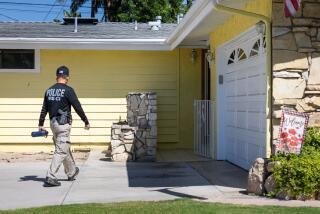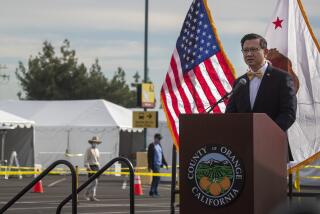Reagan’s $14,000 Rally Bill to Go Unpaid
- Share via
Nearly a year after President Reagan’s reelection rally on the steps of the County Administration Center, county supervisors on Wednesday abandoned efforts to collect more than $14,000 still owed the taxpayers by the Reagan-Bush campaign.
Supervisor Paul Eckert, who assured the public at the time of the Oct. 22 event that the Reagan-Bush campaign would pay the entire bill, confirmed that the board decided in closed session to let the matter drop.
Leon Williams, chairman of the Board of Supervisors, said he was the lone dissenter in the 3-1 vote (Supervisor Susan Golding was absent). Williams, the lone Democrat on the board, had spearheaded the board’s effort to recover the county’s costs from the campaign visit.
“This is not a partisan issue,” Williams said. “It’s an issue of an abuse of public resources. Everybody else is obliged to comply with the law; why shouldn’t the Reagan-Bush campaign?”
“We’ve agreed to accept the pittance, the little bit they gave us,” Eckert, a Republican, said. “The county counsel looked at the cost of attempting to collect the full amount as opposed to what we would get. They figured it wasn’t a very cost-effective move.”
Chief Administrative Officer Clifford Graves said the Reagan campaign paid the county $1,222.83. Still owed is $14,294.59.
The total bill of $15,517.42 included costs for portable toilets, security and buses to transport county workers from temporary parking lots to the county building while the employee lots were closed. Also included were direct costs for county staff members who helped set up the rally site. But the biggest chunk, and the one most at issue, was $12,400 in county staff time--the cost of giving 620 employees two hours off work after the Secret Service ordered the main administration building and the adjacent Health Services Building evacuated.
Graves said the campaign’s attorney, Ronald E. Robertson, contended in a letter to the county that the campaign was not responsible for the lost staff time because it did not order the evacuation.
“The essence of their position was that the majority of the costs were not the fault of the campaign and were directed by the Secret Service for the protection of the President, and they had no control over that,” he said. “The law is fairly clear on what their (the Secret Service’s) obligations are. None.”
Although the county had no written agreement with the campaign, Graves and Eckert both said they recall campaign staff members promising that the county would be reimbursed for all its expenses, including the lost employee time.
Robertson, the campaign’s Washington attorney, could not be reached for comment Wednesday. Carol Hummer, one of two paid staff members for the campaign in San Diego and the person the county listed as a local contact for the event, said she did not know what was called for in the agreement.
“I really don’t know,” Hummer said. “The fellows from the White House, the advance team, set all that up. What details were decided in advance, what was promised and what was not promised, I have no idea.”
Although Eckert said he was disappointed that the entire bill was not paid, he said the county had no choice but to abandon its pursuit of the unpaid portion.
“We see ourselves as the protector of the tax dollar,” Eckert said. “We do whatever we can to cut to a minimum not only the present but the long-term costs. You might go out and prove they owe you $12,000, but you might spend $20,000 doing it. I wouldn’t do that, and I would seriously question anyone else who would spend my money to do that.”
Eckert said he asked Graves to draft a policy aimed at ending the county’s financial risk for such events.
“If you want to take and put up a large deposit, a cash bond, yes, we’ll make arrangements for you to use the facility,” Eckert said. “That will be our policy from now on.”
More to Read
Sign up for Essential California
The most important California stories and recommendations in your inbox every morning.
You may occasionally receive promotional content from the Los Angeles Times.










